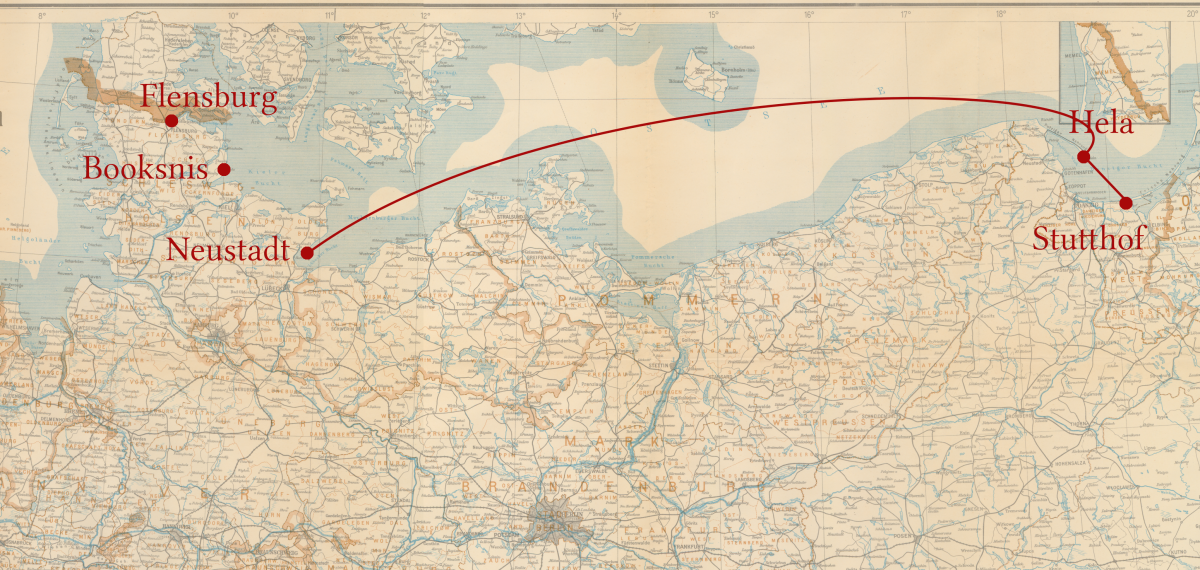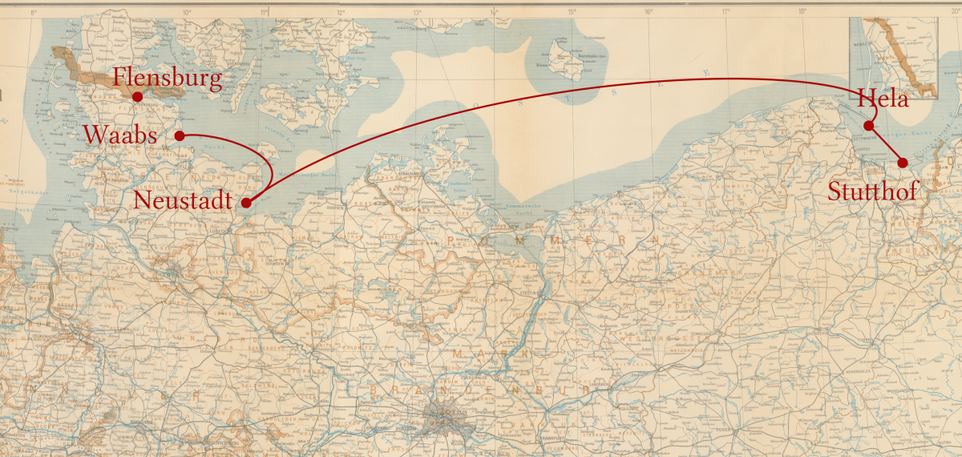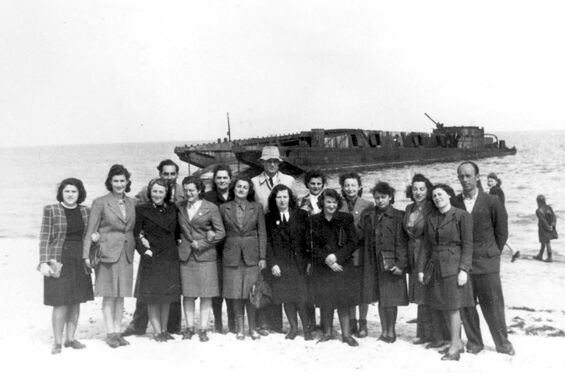Introduction
The claimants report on the atrocities of the death marches: the murder of prisoners, often shortly before liberation, the hunger, the cold and the bombing. For a very detailed description of the events on a death march, see also the biography of Lilli Silbiger. The biography contains excerpts from a judgement against the leader of the death march, Alois Dörr. The events of each day of the death march are described in meticulous detail.
Bassia Berkowicz
born on 10. 12. 1929 in Smorgon. Statement from 1966.
Biography: Summer 1941 to summer 1942 Smorgon ghetto, summer 1942 to summer 1944 Kaunas (Kovno) ghetto, Koschedaren satellite camp, Kaunas concentration camp/Aleksotas satellite camp (airport), Kaunas concentration camp/Kazlu-Ruda satellite camp (peat cutting), summer 1944 Stutthof concentration camp, Stutthof concentration camp/Truns? satellite camp (construction of entrenchments), 27 April 1945 evacuation by ship to Neustadt/Holstein, 3 May 1945 arrival and liberation, Hamburg, Israel.
... but before that they were loaded onto boats, drifted for 10 days on the Baltic Sea and indescribable scenes on the ship brought them to Neustadt Holstein. They landed there on 2 May 1945 and then German sailors came and started shooting at them. On 3 May, the British arrived and freed them.
Notes:
Other prisoners who were transported from Stutthof by ship: Zwi Zaks, Malka Brenner, Bassia Berkowicz, Ruben Fuchs.
Depending on the source, between 4 and 6 boats were used:
- The barges "Wolfgang" and "Vaterland" reached Neustadt/Holstein on 3 May 1945. On the events in Neustadt, see also a transcript of the trial against the guard Bruno D.
- The naval ferry F862 (see ship chronicle) ran aground near Waabs/Booknis on its way to Flensburg on 4 May 1945. The events are described in the article "Der Weg in die Freiheit endete im Bombenhagel in der Eckernförder Bucht" and here ( 5-april-jahrestag-der-see-evakuierung).
- The barge "Ruth" reaches Flensburg (see entry "3.5.1945") on 3 May 1945 with 630 of the original 1000 prisoners.
On the attacks on ships in Neustadt Bay, including the "Cap Arcona" and "Thielbeck", see:
- Norddeutscher rundfunk
- "The future needs remembrance"
- Neuengamme concentration camp/Neustadt satellite camp
All pages were last accessed on 24 February 2024
Malka Brener
born on 1918 in Wirballen. Statement from 13 January 1955
Biography: 1941 Kaunas ghetto, 1944 one month Stutthof concentration camp, Stutthof concentration camp/subcamp Elbling, 11/1944 Stutthof concentration camp, 27 April 1945 evacuated by ship, 3 May 1945 liberation near Waabs
I was loaded onto a ship and taken around the open sea for 8 days on 1 April 1945. - The ship was attacked from the air, I got 3 splinters in my lungs and have been ill ever since. The ship caught fire and we were brought ashore at the last moment by "Graf Moltke Kürsten" in Schleswig-Holstein near Wabsdorf, where I was then liberated by the British.
Abraham Rimler
born on 5 September 1914 in Krakow/Poland. Statement from 1965.
Biography: 6/1941 to 5/1942 Krakow ghetto, 5/1942 to end of 1943 forced labour camp Krakow-Plaszow, approx. 7 months forced labour camp Skarzysko-Kamienna, mid-1944 forced labour camp Tschenstochau-Rakow, early 1945 Buchenwald concentration camp, 4/1945 Theresienstadt ghetto, 9.5.1945 liberation, Krakow, Displaced Persons Camps Hessisch-Lichtenau, Kassel, Landsberg/Lech.
We were then dragged from Buchenwald to other concentration camps as the Russians approached the area, i.e. we were put on the so-called death march. At first we were transported on wagons. At Reitzenheim station, the railway station was bombed and our train was hit. All the prisoners, including the SS who were guarding us, ran away. We ran into the surrounding woods, but soon things got organised and the SS came from all sides. Anyone who ran away and tried to hide was shot mercilessly. I also got a graze shot this time, the little toe of my right foot was injured. Fearing that I was about to be shot, I went back to the train with my shot foot and told the SS that I wanted to return to my commando. I was lucky that they couldn't see my injury. I dragged myself onwards in great pain and arrived at the Theresienstadt concentration camp.
Lea Manne
Born on 11 August 1924 in Tarnow. Statement from 1967.
Biography: tailor by profession, 4/1940 to 8/1943 Tarnow ghetto, 8/1943 to 12/1943 forced labour camp Krakow-Plaszow, 12/1943 to 8/1944 forced labour camp Skarzysko-Kamienna, 8/1944 to 4/1945 Buchenwald concentration camp/external camp Leipzig 4/1945 to 4/1945 Zeithelm/Elbe? concentration camp, Tarnow, 1946 to autumn 1947 Displaced Persons Camp Wegscheid/Linz, Paris, 1956 USA
In mid-April 1945, client was marched with a group of about 20 other girls. They lay in fields during the day and had to march at night. Several of them were unable to continue and were shot. They finally arrived in the evening in a small village, the name of which client no longer knows. The guards left them, but an armed German civilian arrested the Jewish group and took them to the Gestapo in a nearby detention centre. There they were locked in a room together and told that they would be shot in the morning. In the morning it turned out that the camp had been liberated by the Russians shortly before.
Client, who had been expecting certain death all night, could not believe in the liberation at first. She claimed that she was dead and did not eat for the next three days; she was also unable to walk. Her condition improved somewhat when she was given a spoonful of water and soup. Many girls in her group who ate normal food died.
Sara Silbowicz
born 10 February 1927 in Sossnowitz as Sara Zweigenbaum, statement from 1962?
Biography: 1934 to 1939 school for the hearing impaired in Krakow, Sossnowitz ghetto, autumn 1941 forced labour camp Neusalz, Flossenbürg concentration camp, Bergen-Belsen concentration camp, liberation, Displaced Persons Camp Bergen-Belsen, Israel
I only became almost completely deaf in 1945 when I had to take part in the march to Bergen-Belsen and we were bombed. The air pressure from the falling bombs completely destroyed my hearing. We were not allowed to hide and so I was completely exposed to the bombing. Many of my comrades died in the bombing.


